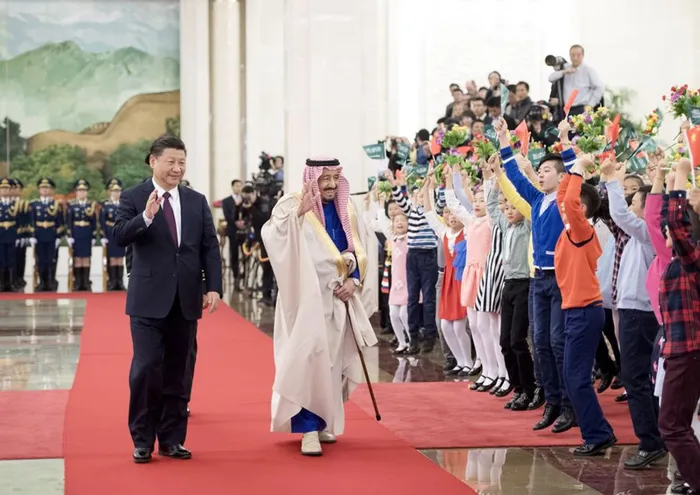Arab League shakes off Washington’s shackles

Picture: Xinhua/Li Xueren Chinese President Xi Jinping holds a welcome ceremony for Saudi King Salman bin Abdulaziz Al Saud before their talks in Beijing, capital of China.
The global hegemony of the United States seems to be rapidly wearing thin in regions such as Africa, Asia, Latin America, and the Middle East. The latter region is in the midst of a consequential geopolitical shift which has seen the regional body, the Arab League and the regional hegemony, Saudi Arabia, slowly shedding the opprobrium of being Washington’s runners in the Middle East.
For example, the Arab League welcomed the Syrian President Bashar al-Assad back to the organisation when he attended the Summit that was held in Jedda, Saudi Arabia, on May 19. Syria was suspended from the organisation in 2011 under pressure from the US following the Syrian government’s brutal and deadly crackdown on mass protests which led to a civil war that is now in its 12th year.
The US supported the rebels that were fighting to overthrow al-Assad’s government. Hence, the move to re-admit Syria in the Arab League is the latest indication of the US waning influence in the region. Predictably, the US expressed its disapproval of the move to re-admit Syria saying that “We do not believe that Syria merits readmission to the Arab League at this time… We continue to believe that we will not normalise our relations with the Assad regime, and we don’t support our allies and partners doing so either”.
In another instance, Saudi Arabia and Iran have rekindled their diplomatic relations in a deal brokered by China after a seven-year stand-off. The deal will reduce the two regional rivals’ involvement in proxy conflicts and eliminate the possibility of a direct conflict between them. The fact that the deal was brokered by China would have caused consternation in the White House as it signals the rise of Washington’s biggest geopolitical rival in a region it has long dominated as its sphere of influence. It also means that the US’ biggest ally in Middle East is getting into bed with its biggest rival thus presenting it with a foreign policy nightmare.
Moreover, Riyadh has also decided to adopt a neutral stance on the Russia-Ukraine war leaving its door open to the warring parties. This would have come as a disappointment to the US which has led a spirited campaign for the global isolation of Russia on account of its invasion of Ukraine. In another move that further signals Washington’s waning influence in the Middle East is Saudi Arabia and Iran’s quest to join the BRICS (Brazil, Russia, India, China, and South Africa) grouping.
BRICS, which came into existence in 2009 promising to challenge the US global hegemony and push for the reform of the international system, presents a strategic hurdle for the US. Its insistence on South-South cooperation has the potential to reshape the international economic order that has long anchored the US global dominance. If Saudi Arabia and Iran are successfully incorporated into the group, it will gain a strategic upper hand over the US and the West.
Africa and the African Union (AU) should be watching what is happening in the Middle East and drawing some lessons. The biggest lesson from the geopolitical shifts in the Middle East concerns the credibility of the US as a partner. For the Middle East to perform such a dramatic geopolitical somersault, it shows that it has been disillusioned with Washington’s treachery and its obsession with maintaining a global order in which it is the chief beneficiary.
It is becoming increasingly clear that the ground is shifting beneath Washington’s feet as global economic power moves ever more rapidly to the East. Therefore, it is important for Africa to resist the recent diplomatic offensive by the US towards the Continent which has seen it publish an Africa policy and deploy some of its heavyweights including Secretary of State Anthony Blinken and Vice President Kamala Harris to the Continent. Just last year the US President Joe Biden hosted African leaders in Washington for the US-Africa Leaders Summit where he promised to strengthen the relationship and double down on US involvement in Africa.
However, Africa should be wary that there is little to benefit for being Washington’s sphere of influence. The US does not want to create a genuine partnership with Africa. Nothing could be farther from the truth. Instead, Washington views Africa as little more than an arena for its geopolitical competition with China and Russia. As soon as the rivalry subsides or their differences are resolved, Africa will become irrelevant to the US. An independent approach to international issues centred on the Continent’s best interests is the best course of action for African leaders.
Further, Africa should be wary of the US divide-and-rule approach which it employed in its dealings with the Middle East. Washington stoked rivalry between Middle East countries and set them at loggerheads with each other for a long time while furthering its narrow geopolitical interests. Hence, Africa should learn from the Middle East and the Arab League in terms of closing ranks and presenting a united front.
David Monyae is an Associate Professor of International Relations and Political Science and Director of the Centre for Africa-China Studies at the University of Johannesburg.
This article is original to the The African. To republish, see terms and conditions.